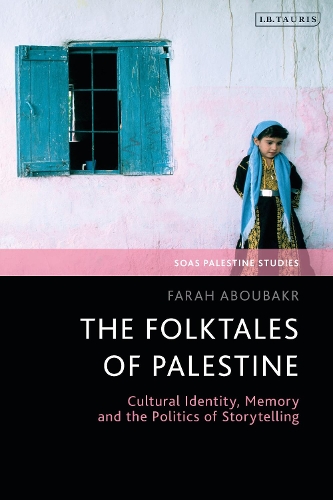
The Folktales of Palestine: Cultural Identity, Memory and the Politics of Storytelling
(Hardback)
Available Formats
Publishing Details
The Folktales of Palestine: Cultural Identity, Memory and the Politics of Storytelling
By (Author) Farah Aboubakr
Bloomsbury Publishing PLC
I.B. Tauris
21st March 2019
United Kingdom
Classifications
Tertiary Education
Non Fiction
Literary studies: c 1900 to c 2000
Social groups: religious groups and communities
Folklore studies / Study of myth
398.2095694
Physical Properties
Hardback
256
Width 156mm, Height 234mm
540g
Description
Folktales are instrumental in ensuring the survival of oral traditions and strengthening communal bonds. Both the stories and the process of storytelling itself help to define social, cultural and political identity. For Palestinians, the threat of losing their heritage has engendered a sense of urgency among storytellers and Palestinian folklorists. Yet there has been remarkably little academic scholarship dedicated to the tradition. Farah Aboubakr here analyses a selection of folktales edited, compiled and translated by Ibrahim Muhawi and Sharif Kanaana in Speak, Bird, Speak Again (1989). In addition to the folktales themselves, Muhawi and Kanaanas collection is renowned for providing readers with extensive folkloric, historical and anthropological annotations. Here, for the first time, the folktales and the compilers work on them, are the subject of scholarly analysis. Synthesising various disciplines including memory studies, gender studies and social movement studies, Aboubakr uses the collection to understand the politics of storytelling and its impact on Palestinian identity. In particular, the book draws attention to the female storytellers who play an essential role in transmitting and preserving collective memory and culture. The book is an important step towards analysing a significant genre of Palestinian literature and will be relevant to scholars of Palestinian politics and popular culture, gender studies and memory studies, and those interested in folklore and oral literature.
Reviews
There is much to glean from Aboubakrs detailed and carefully-referenced work. Besides filling an important gap in academic work on Palestinian culture and heritage, the book enables the reader to comprehend the interwoven strands of Palestinian society and memory and how, without displacing the importance of Palestinian resistance, there are complementary and equally important means through which the historical trauma of the Nakba can be communicated with resilience. * Middle East Monitor *
This book is a timely critical contribution towards expanding the analysis and significance of oral artistic forms of expression in the Palestinian context. In addressing the importance of different forms of orality in the Palestinian context, it re-centers Palestinian voices and aspirations and emphasises their significance in the face of attempts to erase them. * Dina Matar, Chair, Centre of Palestine Studies, SOAS *
For readers and students alike, there is no better example of [folktale scholarship] than Aboubakrs work. Her book not only provides a critical gateway to the tales as they are presented in Muhawi and Kanaanas collections, but also functions as an excellent introduction to Palestinian folk heritage. * Contemporary Levant *
Students of folklore and of folk narratives generally will thank Aboubakr for her meticulous examination, under an academic microscope, of the role of folktales in Palestinian society, the role of women as storytellers, and the role of compilers in choosing which stories to publish. * Journal of Palestine Studies *
Author Bio
Farah Aboubakr is a teaching fellow and researcher at the University of Edinburgh. She specialises in memory studies and Palestinian popular culture and has published in the peer-reviewed journal Marvels & Tales. She completed her PhD at the University of Manchester.
